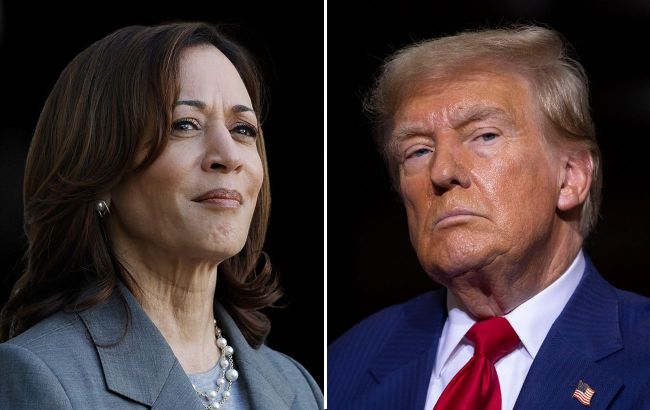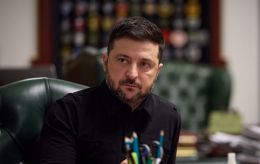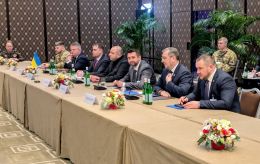Harris and Trump consider Polish Americans key to victory in Pennsylvania - NBC
 Kamala Harris and Donald Trump (collage, RBC-Ukraine)
Kamala Harris and Donald Trump (collage, RBC-Ukraine)
US presidential candidates Kamala Harris and Donald Trump view Polish-American voters as key to victory in Pennsylvania. While this group is relatively small, it is concentrated in battleground states that could determine who occupies the White House, reports NBC News.
What preceded this and what actions did Harris's campaign take
Less than two weeks ago, US Vice President Kamala Harris unexpectedly addressed a group of voters in Pennsylvania during a presidential debate with former President Donald Trump.
"Why don’t you tell the 800,000 Polish Americans right here in Pennsylvania how quickly you would give up for the sake of favor and what you think is a friendship with what is known to be a dictator who would eat you for lunch?" Harris asked Trump.
Since then, the Democratic candidate's campaign has held fundraising meetings with prominent Polish-Americans, including former Representative Tom Malinowski from New Jersey and Chicago attorney Maureen Pikarski.
Additionally, her campaign launched a Facebook page titled Polish Americans for Harris and replaced the current President Joe Biden's photo with Kamala's on the Polish Americans for Biden page.
The Facebook ad, created by Malinowski, targets Polish-American voters. Initially posted on the Polish Americans for Biden page, it now promises that Harris will defend both Poland and Ukraine against Russian aggression. It also features an image of a trumpeter from Krakow, a symbolic representation of Polish resistance to eastern foes.
What is Trump's team doing
Meanwhile, Trump’s campaign announced to reporters that this Sunday he will make a pilgrimage to the National Shrine of Our Lady of Czestochowa - a Catholic center north of Philadelphia revered by Polish Americans.
There, Trump was scheduled to meet with Polish President Andrzej Duda, who was invited to the unveiling of a monument honoring the Solidarity movement that helped topple the Soviet Union.
However, on Thursday, Trump’s campaign stated that the visit would not take place due to reports indicating that Duda is postponing his trip to the US to assess the damage from severe flooding that has affected southwestern Poland.
Conclusion
According to David James Jackson, a political science professor at Bowling Green State University in Ohio, Trump's planned visit to the shrine alongside Duda was likely a response to Harris's debate intrigue.
He noted that both campaigns believe Polish Americans, who make up 5% of Pennsylvania's population, could play a pivotal role in the outcome of the closely contested state, where polls show a very tight race between Harris and Trump.
"The Polish American vote there is meaningful. A question I frequently get is whether there is even such a thing as a Polish American vote. Clearly the Harris and Trump campaigns think so," Jackson said.
He also pointed out that Biden defeated Trump in Pennsylvania in 2020 by just over 80,000 votes.
Dominik Stecula, an assistant professor of communication at Ohio State University, stated that the efforts by Harris and Trump indicate that candidates are trying to court Polish American voters.
"It makes sense. The election will most likely be decided by voters in Pennsylvania, Michigan and Wisconsin, and these states have very large Polish American populations," he concluded.
US election
The US presidential election are just under two months away, scheduled for November 5. The main contenders for the presidency are Donald Trump and Kamala Harris.
On September 10, they faced off in a debate, which a CNN poll indicated was won by the current Vice President.
Moreover, Trump's allies reportedly suggested in private conversations that he either tied at best or lost in the debate.
Following this competition, Trump was offered another round of debates but declined. However, his team believes he may ultimately agree to participate in additional debates.

